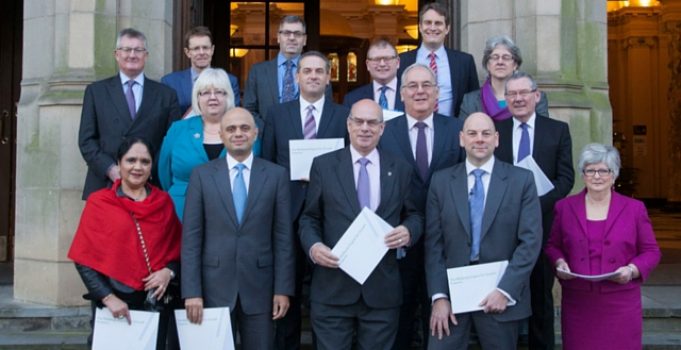
Midlands Engine: working together for economic growth
Secretary of State for Business, Innovation and Skills, Sajid Javid, has presented the Midlands Engine Prospectus at a launch summit, which was also attended by senior politicians and business leaders from the East and West Midlands.
The Midlands Engine sets out the aims for the whole of the Midlands to work more collaboratively to accelerate economic growth and productivity improvement across the region. It will also develop into a global brand that allows the Midlands to promote itself in its entirety to the world.
Held at the Bramall Music Building within the University of Birmingham’s Edgbaston Campus on Friday 4 December 2015, the Midlands Engine launch summit saw regional stakeholders drawn from its business base, local authorities, local enterprise partnerships and education providers coming together to present their shared ambitions.
The prospectus sets out the scale of the region’s ambition and is in response to Government announcements made earlier this year, which linked to plans for the Midlands economy and its desire for increased productivity. It is estimated that the Midlands economy could grow by £34 billion by 2030 if it matched the predicted growth rate for the UK as a whole. In achieving this, it is also suggested that a further 300,000 jobs could be created by the end of this parliament across the Midlands as a whole.
The Midland Engine region already boasts a £222bn (14.6%) contribution in GVA to the wider UK economy, growing by 30% in the last decade. Its strong manufacturing base currently employs 637,400 people, delivering 19.7% of the UK’s total manufacturing output. Seen by many as ‘the place to do business’, the Midlands Engine region has excellent international links with inward investment, growing by 130% during the period 2011 – 2015. In this period, the region attracted 880 foreign investment projects which have in turn created more than 48,000 new jobs, while at the same time safeguarding a further 23,000. The region has also accounted for 16% of the UK’s overall exports in 2013 by selling to more than 178 countries around the globe and overall exports increased by 38% between 2010 and 2013.
Based on these statistics, the Midlands Engine stakeholders believe that it is crucial to build on this level of momentum and will be working closely with the Government to implement the proposals set out in the prospectus. Both parties will promote the use of the Midlands Engine to its fullest in order to ensure and productivity gains anticipated.
Business Secretary Sajid Javid said: “The Midlands is the heartland of our thriving manufacturing sector and home to 25 universities, playing a strong role in the recovery of the UK economy. Over the last year, private sector employment in the Midlands grew more than three times faster than London and the South East.
“But there are more opportunities to capitalise on the Midlands’ natural strengths and assets and make it an engine for growth. Through this prospectus, which sets out the region’s own vision to unlock greater economic growth, it’s time to fire up the Midlands Engine. I commend the leadership shown by the Midlands Local Enterprise Partnerships, Local Authorities and others to come together and pool resources to work towards the shared goal of greater growth for the whole region.”
David Frost CBE, Chair of Stoke-on-Trent & Staffordshire LEP, said: “The Midlands Engine provides a unique opportunity to cement the natural links between business, the public sector and universities. Working together with the LEPs, the aim is to boost productivity and add value to the UK economy.
“There is a real hunger to work across boundaries to build on the strengths that we have in pursuit of building an ever-stronger economy.”
Councillor Anne Western, Leader of Derbyshire County Council, said: “There’s a real will and commitment to restore the Midlands to its former glory as the heartland of British industry and by working together councils in the Midlands can help drive this ambition.
“East Midlands’ towns and cities are a vital cog in the Midlands engine and we all have an important role to play. By continuing to push for investment to spur economic growth in our own back yard we can combine our efforts to strengthen the case for attracting global companies to the region, bringing jobs and prosperity for our communities.”
Professor Sir David Eastwood, Vice Chancellor of the University of Birmingham, said: “As England’s first civic university, it is fitting that the University of Birmingham is convening the inaugural Midlands’ Engine Summit. We welcome the Government’s growing commitment to our region. The prospectus we are launching today is crucial for the delivery of a shared vision that will allow us all to play a role in unlocking the potential of the region.”
Background notes
The Midlands Engine for greater economic growth was developed in response to the Government’s pre-election announcements linked to a Midlands Economic Plan. This plan covered: raising the long-term growth rate; creating 300,000 extra jobs; putting skills at the heart of the economic revival; delivering £5.2 billion of investment into new transport infrastructure; backing science and innovation in the Midlands; and improving the quality of life through regeneration and investment.
The Midlands Engine aims to deliver increased productivity and economic growth achieved by the Midlands region working together in closer collaboration. This will led by the private sector supported and enabled by a range of public sector organisations including national government.
The Midlands Engine aims to provide a brand proposition for the region that positions the Midlands as a major economic driver for the UK, complementing, but distinct from, the Northern Powerhouse. It is part of the Government’s ambition to rebalance the UK economy.
The Midlands Engine seeks to encourage greater collaboration across the region, bringing the East and West closer together. Initially, a number of key activities and sectors will be chosen to drive and improve productivity. These will be scoped thematically, as follows:
- Promotion
- Transport (Midlands Connect)
- Research & Innovation
- Access to Finance
- Skills
Within these five themes, some key areas of work have started to emerge as collaborative opportunities.
- Promotion: How the private and public sector work together to promote the region as a place to do business in; whether this be attracting new private sector investment, enhancing international trade or encouraging individuals to visit and contribute to the economy by taking advantage of the regional offer.
- Transport: is embodied in Midlands Connect and its focus on planning strategically and working with government to prioritise future investment in the transport infrastructure across the region, thereby improving the UK connectivity. Key here is connecting our businesses better with their customers and also allowing employees to attend work in a more efficient manner.
- Research & Innovation: recognises that the business base needs to innovate to maintain and improve its competitiveness. In doing so it needs to connect with the region’s sources of knowledge and those working to ensure that research is translated and exploited for the good of the UK economy. Greater regional collaboration between the University sector and business is being encouraged as part of this, based on key sectors. Examples of this include the recently announced Energy Research Accelerator.
- Access to Finance: Developing a financial system that is designed to meet the needs of the developing economy, utilising a mixture of private sector lending and complementary targeted public support. The initial work focuses on a pan-regional ‘fund of funds’ utilising ERDF and European Investment Bank funding.
- Skills: the Midlands Engine requires a regional skills and employment base that is attuned to the needs of the private sector, and equipped with the qualifications and experience needed to deliver economic prosperity. Initial work will review how the skills agenda can be served at this level, while acknowledging the importance of locally responsive skills strategies


















